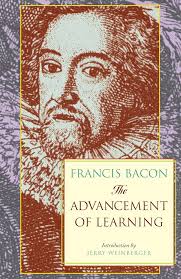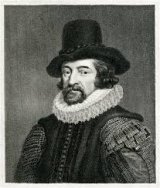The Advancement of Learning Page #12
The Advancement of Learning, published by Francis Bacon in 1605, is a foundational text in the history of science and philosophy. In this work, Bacon advocates for empirical research and the systematic organization of knowledge, laying the groundwork for the scientific method. The book critiques existing scholarly practices and proposes a new approach to learning based on observation and experimentation. It marks a significant shift towards modern scientific inquiry.
- Year:
- 1605
- 1,173 Views
Submitted by acronimous on August 11, 2024
Modified by acronimous on August 11, 2024
Neither is my meaning, as was spoken of Socrates, to call philosophy down from heaven to converse upon the earth—that is, to leave natural philosophy aside, and to apply knowledge only to manners and policy. But as both heaven and earth do conspire and contribute to the use and benefit of man, so the end ought to be, from both philosophies to separate and reject vain speculations, and whatsoever is empty and void, and to preserve and augment whatsoever is solid and fruitful; that knowledge may not be as a courtesan, for pleasure and vanity only, or as a bond-woman, to acquire and gain to her master’s use; but as a spouse, for generation, fruit, and comfort. (12) Thus have I described and opened, as by a kind of dissection, those peccant humours (the principal of them) which have not only given impediment to the proficience of learning, but have given also occasion to the traducement thereof: wherein, if I have been too plain, it must be remembered, fidelia vulnera amantis, sed dolosa oscula malignantis. This I think I have gained, that I ought to be the better believed in that which I shall say pertaining to commendation; because I have proceeded so freely in that which concerneth censure. And yet I have no purpose to enter into a laudative of learning, or to make a hymn to the Muses (though I am of opinion that it is long since their rites were duly celebrated), but my intent is, without varnish or amplification justly to weigh the dignity of knowledge in the balance with other things, and to take the true value thereof by testimonies and arguments, divine and human. VI. (1) First, therefore, let us seek the dignity of knowledge in the archetype or first platform, which is in the attributes and acts of God, as far as they are revealed to man and may be observed with sobriety; wherein we may not seek it by the name of learning, for all learning is knowledge acquired, and all knowledge in God is original, and therefore we must look for it by another name, that of wisdom or sapience, as the Scriptures call it. (2) It is so, then, that in the work of the creation we see a double emanation of virtue from God; the one referring more properly to power, the other to wisdom; the one expressed in making the subsistence of the matter, and the other in disposing the beauty of the form. This being supposed, it is to be observed that for anything which appeareth in the history of the creation, the confused mass and matter of heaven and earth was made in a moment, and the order and disposition of that chaos or mass was the work of six days; such a note of difference it pleased God to put upon the works of power, and the works of wisdom; wherewith concurreth, that in the former it is not set down that God said, “Let there be heaven and earth,” as it is set down of the works following; but actually, that God made heaven and earth: the one carrying the style of a manufacture, and the other of a law, decree, or counsel. (3) To proceed, to that which is next in order from God, to spirits: we find, as far as credit is to be given to the celestial hierarchy of that supposed Dionysius, the senator of Athens, the first place or degree is given to the angels of love, which are termed seraphim; the second to the angels of light, which are termed cherubim; and the third, and so following places, to thrones, principalities, and the rest, which are all angels of power and ministry; so as this angels of knowledge and illumination are placed before the angels of office and domination. (4) To descend from spirits and intellectual forms to sensible and material forms, we read the first form that was created was light, which hath a relation and correspondence in nature and corporal things to knowledge in spirits and incorporal things. (5) So in the distribution of days we see the day wherein God did rest and contemplate His own works was blessed above all the days wherein He did effect and accomplish them. (6) After the creation was finished, it is set down unto us that man was placed in the garden to work therein; which work, so appointed to him, could be no other than work of contemplation; that is, when the end of work is but for exercise and experiment, not for necessity; for there being then no reluctation of the creature, nor sweat of the brow, man’s employment must of consequence have been matter of delight in the experiment, and not matter of labour for the use. Again, the first acts which man performed in Paradise consisted of the two summary parts of knowledge; the view of creatures, and the imposition of names. As for the knowledge which induced the fall, it was, as was touched before, not the natural knowledge of creatures, but the moral knowledge of good and evil; wherein the supposition was, that God’s commandments or prohibitions were not the originals of good and evil, but that they had other beginnings, which man aspired to know, to the end to make a total defection from God and to depend wholly upon himself. (7) To pass on: in the first event or occurrence after the fall of man, we see (as the Scriptures have infinite mysteries, not violating at all the truth of this story or letter) an image of the two estates, the contemplative state and the active state, figured in the two persons of Abel and Cain, and in the two simplest and most primitive trades of life; that of the shepherd (who, by reason of his leisure, rest in a place, and lying in view of heaven, is a lively image of a contemplative life), and that of the husbandman, where we see again the favour and election of God went to the shepherd, and not to the tiller of the ground. (8) So in the age before the flood, the holy records within those few memorials which are there entered and registered have vouchsafed to mention and honour the name of the inventors and authors of music and works in metal. In the age after the flood, the first great judgment of God upon the ambition of man was the confusion of tongues; whereby the open trade and intercourse of learning and knowledge was chiefly imbarred. (9) To descend to Moses the lawgiver, and God’s first pen: he is adorned by the Scriptures with this addition and commendation, “That he was seen in all the learning of the Egyptians,” which nation we know was one of the most ancient schools of the world: for so Plato brings in the Egyptian priest saying unto Solon, “You Grecians are ever children; you have no knowledge of antiquity, nor antiquity of knowledge.” Take a view of the ceremonial law of Moses; you shall find, besides the prefiguration of Christ, the badge or difference of the people of God, the exercise and impression of obedience, and other divine uses and fruits thereof, that some of the most learned Rabbins have travailed profitably and profoundly to observe, some of them a natural, some of them a moral sense, or
Translation
Translate and read this book in other languages:
Select another language:
- - Select -
- 简体中文 (Chinese - Simplified)
- 繁體中文 (Chinese - Traditional)
- Español (Spanish)
- Esperanto (Esperanto)
- 日本語 (Japanese)
- Português (Portuguese)
- Deutsch (German)
- العربية (Arabic)
- Français (French)
- Русский (Russian)
- ಕನ್ನಡ (Kannada)
- 한국어 (Korean)
- עברית (Hebrew)
- Gaeilge (Irish)
- Українська (Ukrainian)
- اردو (Urdu)
- Magyar (Hungarian)
- मानक हिन्दी (Hindi)
- Indonesia (Indonesian)
- Italiano (Italian)
- தமிழ் (Tamil)
- Türkçe (Turkish)
- తెలుగు (Telugu)
- ภาษาไทย (Thai)
- Tiếng Việt (Vietnamese)
- Čeština (Czech)
- Polski (Polish)
- Bahasa Indonesia (Indonesian)
- Românește (Romanian)
- Nederlands (Dutch)
- Ελληνικά (Greek)
- Latinum (Latin)
- Svenska (Swedish)
- Dansk (Danish)
- Suomi (Finnish)
- فارسی (Persian)
- ייִדיש (Yiddish)
- հայերեն (Armenian)
- Norsk (Norwegian)
- English (English)
Citation
Use the citation below to add this book to your bibliography:
Style:MLAChicagoAPA
"The Advancement of Learning Books." Literature.com. STANDS4 LLC, 2025. Web. 11 Mar. 2025. <https://www.literature.com/book/the_advancement_of_learning_3165>.








Discuss this The Advancement of Learning book with the community:
Report Comment
We're doing our best to make sure our content is useful, accurate and safe.
If by any chance you spot an inappropriate comment while navigating through our website please use this form to let us know, and we'll take care of it shortly.
Attachment
You need to be logged in to favorite.
Log In